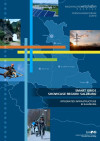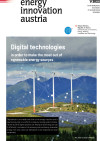Suchergebnisse für "Factsheet%3A Energietechnologien gestalten%2C die f%C3%BCr alle sinnvoll und nutzbar sind"
lieBeKlima - quality assurance of cross-property greening for urban climate resilience in the neighbourhood development "Am Kempelenpark"
lieBeKlima aims to initiate the implementation of a cross-property and cross-system greening concept for the "Am Kempelenpark" neighbourhood development. This will be realized with innovative, identity-creating participation processes and a comprehensive quality assurance process. The focus lies on an interconnected consideration of integral greening concepts with higher-level water management and plus-energy concepts.
Innovative moth-protection system for sheepwool insulation

This project developed a novel "bio-pesticide"-formula by screening plant extracts and minerals for their strong repellant activity in order to protect sheepwool insulation from cloth moth infestation. It was investigated and examined by state-of-the-art-technology that the anti-moth-mixture extracted from plants and minerals, acts as a valid alternative to existing pest control agents.
e80^3-Buildings - Sub project 4: Demonstration object
Alongside the realisation of the plus energy building in Kapfenberg, a demonstration project is scheduled to be created that accomplishes an economically viable and technically innovative solution for the future.
(energy central 400+) Marketable energy central from 400 kW with innovative, simple electricity conversion for residential building, public utility and commercial objects
Development of a marketable, decentralised "energy central" on a scale from 400 kW for the generation of electricity, heating (and cooling) for residential building, public utility and commercial objects, with a broad variety of applicable fuels on the base of regionally available biogenous residual materials.
Wall systems made of renewable resources

Testing and optimising post and beam straw bale constructions Testing the thermal insulation (specific heat conductance) and fire resistance of a construction (combustibility grading period), optimisation of building junction elements, development of a mobile testing lab for efficient and effective quality management
SPACE4free - Retrofitting souterrain areas in 19th century townhouses to apartments with high quality of life and low energy consumption
Planning of durable and damage-free apartments with high quality of life and low energy consumption in moisture exposed souterrain areas of 19th century townhouses. Using innovative ventilation control systems comfortable room climate will be created. Additionally the tolerance of different types of use is ensured. A planning tool enables the scaling of the findings and thus the applicability to various planning situations.
LZE 100 Lighthouse Objects - Long-term evaluation of the energy consumption of 100 energy-efficient buildings in Austria as a representative cross-section of Austrian lighthouse objects
Collection, evaluation and analysis of energy consumption data from 100 energy-efficient buildings in Austria over an operating time of 3 to 25 years as a representative cross-section of Austrian lighthouse objects. Differentiation according to building types, energy sources and determination of real greenhouse gas emissions. Comparison of the measured consumption to benchmark values.
User-friendly heating and ventilation systems for low energy and passivehouses

The goal of the research project is the evaluation of different heating and ventilation systems for passive- and low energy multi family and office buildings taking into account indoor climate, possible variation of user behaviour, final and primary energy demand, costs, space demand and fail save installation and operation.
Photonic Cooling – Efficient cooling of buildings through the use of photonic
Within the scope of the project a photonic cooling approach was investigated and evaluated in terms of feasibility and cost efficiency for building applications. In particular cost-efficient photonic surfaces and concepts were investigated which need to have a high reflectivity in of the incident solar radiation (>97%) and a high emission coefficient within the spectral range of 8 – 13 micrometer in order to enable the emission of heat into the sky.
SUPROMED: Reprocessing and Reuse of Single Use Medical Devices in the Light of Sustainable Development Criteria - Implementation in Austria
In contrast to other countries there is currently no reprocessing and reuse of single use medical devices in Austria. Thus the potential for major ecological and economical savings remains unused. In a stakeholder dialogue, practical implementation strategies were developed to change the trend towards a sustainable value-added chain.
Supply Chain Forest-Logistic-Saw as First application of platform of IT/Telematics concepts for resource efficient forestry use in montane forest
A Supply Chain Management concept for sustained use of the mountain forest in collaboration with all the individual participants is to be drawn up. Harvesting and transport from the forest to the mill will be registered and controlled by WEB-GIS technology. A CO2 balance sheet will be prepared and optimization potentials shown in the process. An outline will be made of an integrated job model.
WHISCERS. Whole House In-Situ Carbon & Emission Reduction Solution
Whiscers is a system for installing internal wall insulation with minimal mess, whilst the resident remains in the property. It involves measuring the walls in the property using a laser device that enables fast and highly accurate measurement. Information is then sent electronically to a computer controlled off-site cutting machine that is rapid, precise and mess-free.
RISKMIN - Risk minimization along the value-added chain of plants to the colouring pigments
RISKMIN is a project for the mitigation of risks along the supply chain of plant raw material to the provision of plant dyestuff. Considering the measures concerning risk mitigation, a business plan for a plant dyestuff manufacturer for the effective realization of the business idea was created.
Competence- and knowledge centre of renewable energies and passive house technology

Arrangement of a passive house village for test living in the context of an innovative settlement expansion. Building up a large dimensioned passive house for consulting, training, exhibitions, research and distribution of passive house technology and know-how in the field of energy efficient and sustainable building.
LOW TECH innovation-lab - real laboratory for the transformation to climate and resource-saving energy regions with innovative LOW TECH solutions
LOW TECH innovation-lab aims to set up an innovation laboratory in which innovative model solutions are developed, tested and widely rolled out in cooperation with suitable pilot regions on the basis of an optimized approach with regard to the use of technology on the one hand and the potential of the circular economy, local environmental resources and social innovations on the other.
home dreams

Listening to the inhabitants of innovative buildings and using their satisfactory and unsatisfactory experiences as the basis for drawing up practice based criteria and recommendations for a quality, user-orientated building policy. The target groups are funding bodies, building contractors and town planners.
IEA Bioenergy Technology Collaboration Programme (IEA Bioenergy TCP)
IEA Bioenergy’s vision is to achieve a substantial bioenergy contribution to future global energy demands by accelerating the production and use of environmentally sound, socially accepted and cost-competitive bioenergy on a sustainable basis, thus providing increased security of supply whilst reducing greenhouse gas emissions from energy use.
Smart Grids Showcase Region: Salzburg

Integratred Infrastructure in Salzburg
Forschungsforum
2/2010
Herausgeber: BMVIT
Englisch, 6 Seiten
Downloads zur Publikation
Digital technologies

Digital technologies in order to make the most out of renewable energy sources.
energy innovation austria
1/2022
Herausgeber: BMK in cooperation with the Climate and Energy Fund
Englisch, 12 Seiten
Downloads zur Publikation
Sustainable Business Planner
Further development of the established management concept business plan to the Sustainable Business Plan. Production, testing and dissemination of the holistic user-oriented IT Tool "Sustainable Business Planner" in the context of an Austrian start-up initiative.
